Paula Vince's Blog: The Vince Review, page 48
June 25, 2017
'The Scandalous Life of Sasha Torte' by Lesley Truffle

Revenge, redemption ... and pastry. In the winter of 1912 on the wild West Coast of Tasmania, Wolfftown's most notorious heiress and murderess, Sasha Torte, tells the tale of her own spectacular downfall.
Forsaken by her parents and raised by criminals and reprobates, Sasha becomes a world-famous pastry chef at the tender age of seventeen. Entanglement with the disreputable Dasher brothers leads to love, but also to a dangerous addiction.
Behind bars in Wolfftown's gaol, Sasha sips premium champagne as she recalls a life of seduction, betrayal, ghosts, opium and an indiscreet quantity of confectionary - and plots her escape.
The Scandalous Life of Sasha Torte: revenge, redemption and pastry, is a novel of dastardly deeds, intrepid protagonists, dark villains, wild gangs, luxurious hotels … and murder.
MY THOUGHTS:
During the nineties, I used to watch a TV cartoon called 'Horrible Histories', which was a satirical look at world events for kids. This novel is a little like an adult version of the program for romance readers. It's full of risque innuendo, but we're warned about this from the outset if we want to cut and run. The story takes place in Tasmania in 1912, when the 22-year-old heroine begins her memoir which sets out to explain why she's been wrongfully imprisoned on a murder charge in the old town gaol.
The rollicking story takes place in flashbacks, which brings us to Sasha's present, including how she happened to become a world class patissiere. With a play on words name like Sasha Torte, we can predict it's bound to be light-hearted on the whole, but Sasha doesn't gloss over her darker times. In her family background alone, there's a history of bipolar disorder in the women of her mother's side. Of course they never called it that back then, but although it wasn't a recognised condition, they still had to deal with the huge swings between euphoria and crashing depression.
To compress so many genre elements within the one story, it has to be fast moving. There are good guys and bad guys, all larger than life. There's mystery and romance, adventure and history, and even bits of natural history. The quiet appearance of a strange creature which turns out to be a Tasmanian Tiger is up there among my favourite moments.
On the whole, it got a bit too cute and quirky for me at times, yet I found myself wondering if it was just the sassy writing style that I found a bit much in such a big dose. I'd be interested to see how I'd compare the two mediums if I were to see the same story on the screen.
Thanks to Harper Collins Australia and Net Galley for my review copy.
3 stars
Published on June 25, 2017 02:49
June 21, 2017
Why I loved the 'Peculiar Children' series
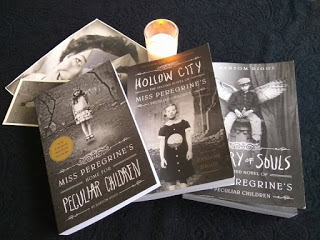
Warning, a few plot spoilers.
One thing I love about fiction is that we sometimes learn some pretty decent lessons by osmosis. Maybe we can get the same from studying text books, but I prefer a great story. It's like being offered a healthy vitamin. We can choose whether to take it as a bitter pill or a tasty chocolate bar. This series, full of creepy old vintage photos, is presented as nothing more than a funny, fast-paced, often sensational story, yet does it work on our emotions, and maybe even our characters. Here's some of the reasons I recommend these books with the freaky covers, for what they show us.
1) We can try to let go of unhelpful tension.
Until a pivotal moment, the hero Jacob Portman has been gritting his teeth with panic and desperately trying to force himself to face the terrifying hollowgasts. The people he loves are certain fighting the beasts must be his destiny, but he hasn't convinced himself to agree with them in either practice or theory. (Jacob reasons that becoming adept at anything requires practise, but failing at this particular skill even once will result in instant death.) The turning point comes at a critical moment where he believes he's lost all hope. A hollowgast is towering over him with all five tongues lolling, and he accepts that he's done for. Suddenly, Jacob relaxes into it, and finds strange new words and commands flowing to his tongue which immobilise the beast. Jacob is amazed. He knows while he's on edge, using every nerve to figure out what to do next, problems pile up, and he finds himself beaten around by circumstances. Perhaps we readers can use the storybook analogy to help face our own monsters, whether they be depression, panic attacks, fear, or anything else.
2) We mustn't be quick to write anything off as impossible.
In other words, keep an open mind.
I love how Enoch and Hugh start scoffing at the plausibility of what they assume is a very tall tale. Bronwyn has been reading the younger children a story from 'Tales of the Peculiar'. They instantly state how ridiculous and impossible it is to believe. Then Jacob says in effect, 'Come on guys, just a few weeks ago, I thought the exact same thing about the existence of people like you.' They can't help grinning when they get what he means. We should keep our minds open. Only foolish people who believe they're wise are quick to instantly dismiss new ideas as implausible.
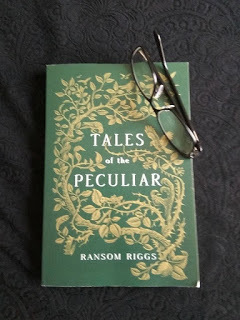
3) We should aim to understand what drives us.
Don't go the opposite extreme and believe everything you hear either.
Miss Peregrine's brother Caul, the ultimate villain, is hugely ambitious. He seeks power, reversal of age, immortality, fame and adoration. Yet he presents himself to his followers as a good guy, an underdog fighting valiantly to 'wrest the control of our society from the infantilising influence of ymbrynes.' What's more, he seems to have convinced himself to believe his own words. Poisonous envy of his sister has inspired him to brainwash and inflame others, but they don't even realise it, and neither does he. If something is worth fighting for, we must make every effort to thoroughly understand what we're supporting. Getting educated about what's going on around us is always worthwhile.
4) We should cling to faith and optimism.
Emma Bloom tries to encourage Jacob by saying, 'Doubt is the pinprick in the lifeboat.' She is an admirable character who depends on her inner strength, and trusts that her attitude will always be strong enough to see her through. I've recorded another quote from her. 'There's a pain sensor inside me that's not switched on. I can block out awful things and get on with it.' That's something I'd like to be able to echo, and perhaps we can, when we remember characters like Emma and follow her example by choosing to let go of feelings, resentments and hurts which aren't helping us, but may in fact be bogging us down. Focusing on positive, helpful things may enable us to just get on with what needs to be done.
5) The world around us helps to shape our gifts and talents
This is a theory put forward by Mother Dust, an enigmatic healer who has a heart to help others, but physically wears herself away to powder whenever she's doing what she does best. In the scope of this story her words apply particularly to peculiars, but the principle applies to any one of us. She believes that early in our development, we easily identify basic skills, interests and passions in ourselves. The directions they take are shaped to an extent by our environment, because when we believe we see a need, we focus on developing the necessary talents to fulfill it, to the exclusion of others. It's not that nothing else is possible for us, but nothing else is nurtured. Sounds like how we may come to identify our callings.
6) We should never be ashamed of attributes that set us apart.
Miss Peregrine always makes it clear, 'Nobody under this roof is ashamed of their gift.'
Over again, we see peculiars in these stories being shunned and marginalised by the 'normals' of our society, because majority rules. Rather than being admired, differences tend to be made fun of. But the shortsighted attitude is shown to be ridiculous, since peculiar attributes are harmless at least, and vital weapons at best. It's so easy to own the shame as our own when people pick on us, without ever questioning the validity of what they say. For years as a school kid, others teased me for having a 'big head'. I used to get very upset, but never once did it occur to me to question, 'So what?' Why should the size of my cranium have any bearing on the sort of person I am? Hopefully, these books will help make readers bully-proof, all the while they're enjoying the action.
Has anyone else read them? Or have I convinced you to give them a go some day?
I've reviewed each of the three books individually, Miss Peregrine's Home for Peculiar Children, Hollow City and Library of Souls.
Published on June 21, 2017 12:00
June 18, 2017
'The Brothers Karamazov' by Fyodor Dostoevsky
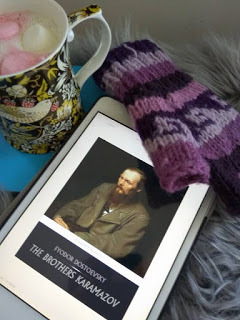
The murder of brutal landowner Fyodor Karamazov changes the lives of his sons irrevocably; Mitya, the sensualist, whose bitter rivalry with his father immediately places him under suspicion for parricide; Ivan, the intellectual, whose mental tortures drive him to breakdown; the spiritual Alyosha, who tries to heal the family’s rifts; and the shadowy figure of their bastard half-brother Smerdyakov. As the ensuing investigation and trial reveal the true identity of the murderer, Dostoyevsky’s dark masterwork evokes a world where the lines between innocence and corruption, good and evil blur, and everyone’s faith in humanity is tested.
The Brothers Karamazov is a passionate philosophical novel set in 19th century Russia, that enters deeply into the ethical debates of God, free will, and morality. It is a spiritual drama of moral struggles concerning faith, doubt, and reason, set against a modernizing Russia.
MY THOUGHTS:
This was my choice for the Russian Classic category of the 2017 Back to the Classics Challenge. I was most intimidated by this category, since I assumed Russian classics are probably mostly thick-as-brick epics filled with tragic events in ice and snow, with political uprisings, tsars and serfs in the background. This book sounded interesting because the blurb said it could well be one of the greatest novels of all time, and that's a very bold claim. I was sceptical about that, but then I started, and WOW! Now I'll have to call it one of my all time favourites. As well as being quite an intense family saga, it's all about faith versus doubt, and reason versus passion. It is pretty thick, but I wanted to keep reading every chance I could.
It all takes place in a little village called 'Skotprigonyevsk.' Luckily for us, most of the time it's simply referred to as 'our little town.'
Fyodor Pavlovitch Karamazov is a lecherous, unpleasant old man who has three sons in their twenties from two different wives, both of whom he treated horribly. On the surface, each of the boys could be said to represent one of the three aspects of man. There's physical Dmitri, who can't master his earthly passions; intellectual Ivan, whose brain keeps torturing him; and spiritual Alexey, who feels called to enter a monastery as a novice, aged twenty. If you think this makes them sound like cardboard, one-sided characters, no way! They are all deep and complex enough to make us love them.
Oh, and there's also Smerdyakov, Fyodor's young servant. Although it's never been openly acknowledged, everyone is 99.9% certain that he is actually his illegitimate son, since Fyodor was rumoured to have raped 'Stinking Lizaveta' the mute village vagrant who gave birth in his garden. Although Smerdyakov knows better than to ever acknowledge his half brothers as such, there's a major chip on his shoulder as he hangs creepily in the background. Dmitri calls him, 'the epitome of all the cowards in the world on two legs, with no character to speak of.'
One night, old Fyodor gets what many believe was probably coming to him. Someone smashes the back of his skull and kills him, and it was most likely one of his sons, who have a swarm of motives between them.
It's easy for everyone to pin the blame on Dmitri, whose name is shortened quite often to Mitya. An impulsive guy who'll wear his heart on his sleeve, he always speaks (or punches) before he thinks. He made no secret that he wanted to kill the old man, who has not only withheld Dmitri's inheritance from his mother, but is also trying to use it to seduce Grushenka, the girl Dmitri loves. But undercurrents are bubbling away elsewhere too, so is it really that clear cut?
The brilliant Ivan, the middle brother, is a scholar with a major existential crisis. He can't dismiss the idea that man invented God to suit himself, rather than vice versa. I came to really appreciate the raw and honest young atheist whose huge intellect and photographic memory become burdens rather than gifts. His flippant approach conceals his desperation, giving me the impression that he's so open with his youngest brother because he'd love to be convinced out of cynicism into faith. And Ivan's madly in love with Katerina, the fiance Dmitri dumped so he could pursue Grushenka. So their eldest brother is not Ivan's favourite person.
The youngest is also known as Alyosha, which seems to be a derivative of Alexey. He's the mortar that pulls the whole story together. He loves unconditionally, never finds fault, and often becomes our lens. I doubt I would have loved Dmitri and Ivan so much if I didn't see them through Alyosha's eyes. Perhaps most importantly, he makes me think of Jesus' commission for his friends to be his hands and feet. Ivan spends so much time griping about the lack of proof of God's existence, but I think his smartness just caused him to search in the wrong places. He need look no further than his kid brother to see concrete proof that the spirit of God exists, through the lives of his followers. Even the omniscient narrator refers to Alyosha at one point as, 'the young hero I love so much.'
So there's the scenario. Even though we get to love each of the brothers heaps, at the same time, we can't help wondering which of them may be tied up with the murder, and how. Or was it a combination crime? And the solution is all tied with blackmail, psychological twists that do your head in, and arguably justice. Before I get too carried away, I'll give some quotes from the story. Needless to say, a book this thick is full of them, but the following are a few of my favourites.

Father Zossima, the old man who was Alexey's mentor and hero, has some good things to say for a start. He also predicts that his young follower will, 'bless life, and make others bless it.'
1) Men are made for happiness, and anyone who is completely happy has a right to say to himself, "I am doing the will of God."
2) Precious memories may remain even of a bad home, if only the heart knows how to find what is precious.
3) If you love everything, you will perceive the divine mystery in things.
4) Love the animals. God has given them the rudiments of thought and joy untroubled.
Ivan Karamozov's thoughts are possibly poles apart from Father Zossima's, but maybe equally worthy of thought.
1) I don't understand how anyone can love one's neighbour. For anyone to love a man, he must be hidden, for as soon as he shows his face, love is gone. One can love one's neighbour in the abstract, or even at a distance, but at close quarters, it's almost impossible. (Yeah, he's a cynical dude.)
2) People sometimes speak of bestial cruelty, but that's a great insult and injustice to beasts. A beast can never be so artistically cruel as a man.
(At one point, Ivan has a conversation with the devil, who's sitting on his couch during a time when he's sick. The doctors warned Ivan that he may be subject to hallucinations, but he wouldn't listen. It's a very interesting chapter, with some fascinating dialogue.)
Ivan (trying to disprove the hallucination): You're just an incarnation of myself, but only one side of my thoughts and feelings. Only the nastiest and stupidest of them.
Satan: If I'm like you in my way of thinking, it's all to my credit.
Satan: From the vehemence with which you deny my existence, I'm convinced that you believe in me.
Ivan: Not in the slightest. I haven't a hundredth part of a grain of faith in you.
Satan: But you have the thousandth of a grain. Homeopathic doses perhaps are strongest.
But one of the book's best quotes was by Dmitri. He's a guy who normally drops lines such as, 'On the way here it seemed alright, and now it's nothing but nonsense.' The narrator says that at one point, 'an absurd, chaotic confusion followed, but Mitya was in his natural element and the more foolish it became, the more his spirits rose.' So this heartfelt quote by him is a great place to wrap up this review.
Dmitri: It's God that's worrying me. What if he doesn't exist? Then man is the chief of all the earth, the universe. Magnificent. Only how is he going to be good without God? I always come back to that. For whom is man going to love then? To whom will he be thankful? To whom will he sing the hymn?
Sometimes I wondered just what the women in Fyodor Dostoevsky's life must have been like, because I doubt there's one female character who didn't have a hysterical fit at some point in the story. They grew on me though, just like the guys. I really liked Grushenka by the end, and Katerina made me grin when she called Alyosha a 'religious little idiot' just because he hit a bit too close to home at one time. Feisty ladies indeed.
Altogether, this has to be one of the books of the year for me. And since there's probably no way I'd ever have read it if I hadn't been doing this reading challenge, you can consider this blog post a great shout out for reading challenges too.
5 stars
Published on June 18, 2017 12:00
June 15, 2017
A list of wonderful manservants
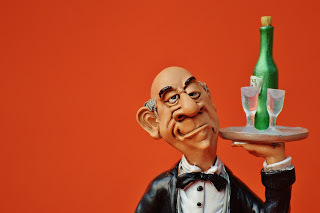
During my reading this year, it keeps standing out to me that some of the most excellent characters in given books are the servants. Have you noticed that literature is full of stories where a servant steals the show? In some cases he becomes even more legendary than his master, or at least equally so. It made me wonder why that may be the case, especially since many servants have tended to be looked down upon and taken for granted throughout the centuries. Perhaps hero servants keep popping up to encourage us to be noble, generous and kind-hearted, regardless of our circumstances. They seem to remind us that's there's never a good reason to be resentful or churlish about our occupations, because life is what we make it. Maybe people in humble circumstances are actually the lynch pins of society, doing so much good in so many ways. Here are ten that have popped out at me, and I love them all.
1) Sam Weller
 He was Mr Pickwick's young servant, with enough sharp intelligence to appreciate his master's many excellent qualities. Sam was devoted to his employer to such an extent that when Pickwick was thrown into debtor's prison over a matter of principle, he devised a way of getting arrested, so he could follow on his heels and continue to serve him. Sam asked his jolly old father to accuse him of being unable to repay a loan, which of course was completely false. But being the Victorian era, when anything could get a man thrown in jail, his plan worked. My review is here.
He was Mr Pickwick's young servant, with enough sharp intelligence to appreciate his master's many excellent qualities. Sam was devoted to his employer to such an extent that when Pickwick was thrown into debtor's prison over a matter of principle, he devised a way of getting arrested, so he could follow on his heels and continue to serve him. Sam asked his jolly old father to accuse him of being unable to repay a loan, which of course was completely false. But being the Victorian era, when anything could get a man thrown in jail, his plan worked. My review is here. 2) Passepartout
2) PassepartoutThe young French acrobat didn't know what lay ahead of him when he was employed by Mr Phileas Fogg. Although Fogg was exacting and never forthcoming, Passepartout's loyalty never swerved. Even when the detective Fix almost managed to convince him that Fogg had robbed a bank, Passepartout decided that accusatory hearsay would not influence the scrupulous way in which he served his master, who trusted him. Not only was he intensely loyal, but saved the day on several occasions (He saved several of the 80 of them, in fact). My review is here.
 3) Gabriel Betteredge
3) Gabriel BetteredgeThe elderly butler and head of staff is fiercely devoted to the Verinder family, since he served them from his boyhood, and therefore remembers every single one of them from their infancy. For that reason, he's not going to cave in to wild rumours that one of them might be a thief or scoundrel. He knows them as well as anybody, and will never stop standing up for them. My review is here.
4) Jeeves
 He appears in several stories by P.G. Wodehouse. Young Bertie Wooster is a member of the idle upper class, who keeps finding himself entangled in awkward social messes, because of his naivety. And the British aristocracy may well have been the worst crowd to possibly upset. Bertie is a complete embarrassment to his poor Aunt Agatha, but his butler Jeeves has the loyalty and sense to keep saving the day with complete tact. Perhaps he was one of the most under-paid servants in history, when you consider all the extra stresses that made up his day's work.
He appears in several stories by P.G. Wodehouse. Young Bertie Wooster is a member of the idle upper class, who keeps finding himself entangled in awkward social messes, because of his naivety. And the British aristocracy may well have been the worst crowd to possibly upset. Bertie is a complete embarrassment to his poor Aunt Agatha, but his butler Jeeves has the loyalty and sense to keep saving the day with complete tact. Perhaps he was one of the most under-paid servants in history, when you consider all the extra stresses that made up his day's work.5) Friday
 He's the worker Robinson Crusoe obtained for himself while he was shipwrecked on a lonely island. He named him after the day of the week he appeared, and ended up teaching him English and converting him to Christianity. Friday is grateful and obedient, since he considered Crusoe helped saved his life. He'd been destined to be a meal for cannibals. I read this long, rambling book years ago at Uni. One thing many people may not realise is that Robinson Crusoe had been on an expedition to fetch slaves in Africa when he was shipwrecked. The book has its fair share of British cultural imperialism, with Crusoe referring to himself as the 'king' of the island, and regarding Friday as a savage he needed to tame. It wasn't my favourite book, but I did appreciate a little joke I once heard, that Robinson Crusoe was the only man who ever managed to get all his work done by Friday :)
He's the worker Robinson Crusoe obtained for himself while he was shipwrecked on a lonely island. He named him after the day of the week he appeared, and ended up teaching him English and converting him to Christianity. Friday is grateful and obedient, since he considered Crusoe helped saved his life. He'd been destined to be a meal for cannibals. I read this long, rambling book years ago at Uni. One thing many people may not realise is that Robinson Crusoe had been on an expedition to fetch slaves in Africa when he was shipwrecked. The book has its fair share of British cultural imperialism, with Crusoe referring to himself as the 'king' of the island, and regarding Friday as a savage he needed to tame. It wasn't my favourite book, but I did appreciate a little joke I once heard, that Robinson Crusoe was the only man who ever managed to get all his work done by Friday :) 6) Samwise Gamgee
6) Samwise GamgeeHe starts off in Lord of the Rings as Frodo Baggins' humble gardener, and is dragged off on the quest sort of accidentally, when he overhears a private conversation. It was the best thing that could have happened to Frodo, since Sam proves to be steadfast, strong and devoted. He saves the day on several occasions to the point of physically carrying Frodo when he's too weak to continue alone. And as a bonus, Sam turns out to be one of the few characters capable of resisting the pull of the Ring. What a hero!
 7) Sancho Panza
7) Sancho PanzaHe's the illiterate farmer who was dragged along on the adventures of the delusional Don Quixote, who asked him to be his squire. Sancho's initial lure was the hope of the vague grand reward that Quixote promised. He considers himself to be the pragmatic realist, with enough common sense to balance his master's flights of fancy. However, the faithful sidekick role grows on him, and he does pick up some of his master's romanticism and idealism, despite himself.
8) Hagrid
 The simple-natured half giant is groundskeeper at Hogwarts. His love and devotion to his employer, Albus Dumbledore, is equal to that of his favourite student, Harry Potter. However, although Hagrid always had the best intentions, he needed keeping an eye on at times. He's a bit scatterbrained and makes the occasional stuff-up, of which I'll mention no plot spoilers. But his wonderful character and powerful frame make him an excellent person for Dumbledore to call a loyal follower.
The simple-natured half giant is groundskeeper at Hogwarts. His love and devotion to his employer, Albus Dumbledore, is equal to that of his favourite student, Harry Potter. However, although Hagrid always had the best intentions, he needed keeping an eye on at times. He's a bit scatterbrained and makes the occasional stuff-up, of which I'll mention no plot spoilers. But his wonderful character and powerful frame make him an excellent person for Dumbledore to call a loyal follower.9) Merlin
I'm talking specifically about the TV series of the same name. It ran between 2008 and 2012, and was an interesting take on the Arthurian legends, since Merlin was the teenage servant of the equally young Arthur, who had no clue of Merlin's true skills. Arthur's father, Uther Pendragon, had banned magic throughout the land, so Merlin had to keep his powers top secret. But he used them over and over to help save the oblivious Arthur's life. Lack of thanks was just part of the job.
10) Eliezer
He's generally believed to be the trusted servant of the patriarch Abraham, who was sent from Israel back to Abraham's birth place in Mesopotamia, to find a wife for his beloved son Isaac. Eliezer relied heavily on prayer and God's leading every moment, which helped him return with the right girl, Rebecca. Eliezer was probably the servant who was expected to inherit all of his master's vast wealth, when it seemed Abraham would never father an heir of his own flesh. That's makes Eliezer's devotion and hard work all the more impressive, since he went on giving the job his all without feeling hard-done-by.
How many of these are you familiar with? Do you love any of them yourself? And as always, I'd love it if you could suggest any more.
Published on June 15, 2017 12:00
June 12, 2017
'I Capture the Castle' by Dodie Smith
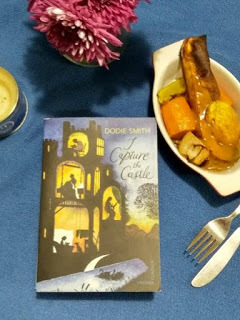
Through six turbulent months of 1934, 17-year-old Cassandra Mortmain keeps a journal, filling three notebooks with sharply funny yet poignant entries about her home, a ruined Suffolk castle, and her eccentric and penniless family. By the time the last diary shuts, there have been great changes in the Mortmain household, not the least of which is that Cassandra is deeply, hopelessly, in love.
MY THOUGHTS:
I don't know why it took me so long to ever read this, because it was delightful. It's set in the English countryside in 1934. The story is written in the form of 17-year-old Cassandra's diary. On the surface, her family's lifestyle appears romantic and idyllic. They live in an ancient castle, and her father is the celebrated author of a best-seller. But behind closed doors, everything is shabby and ramshackle. He's had writer's block for several years, and his lecture circuit days are far behind him. Things are falling apart, they're always a little hungry, and nobody has earned a cent for months.
All the Mortmains felt like family by the time I reached the end. Cassandra's beautiful sister Rose is a self-proclaimed gold digger, who vows she'd make a deal with the devil to get out of their financial straits. Their stepmother Topaz used to be an artist's model, but now simply does the housework, although she keeps up some of her Bohemian and free-spirited ways. The younger brother Thomas is bookish and perceptive. And then there's Stephen. He's not really a family member at all, but the son of their housekeeper. He stayed on with them after her death, and makes no secret that he's in love with Cassandra. And he's stunningly good looking. But she only thinks of him as a brother.
One wet evening, their two young landlords lob there unexpectedly. They are Simon and Neil Cotton, the wealthy brothers who will inherit the big property next door, and it's their first time in Britain. Romantic intentions and mess-ups are unleashed everywhere. The characters all find that the most sensible people to fall in love with aren't the ones who steal their hearts.
Cassandra's wry reflections about life were the highlight for me. Seventeen is a perfect age for this main character, because she swings back and forth between considering herself a woman and a child. Or maybe Cassandra is on a threshold, and really is both a woman and child simultaneously. She reminds me what seventeen was like. Although you feel you still have a lot to learn, some of your insights are probably fresher and closer to the truth than the adults', who have let conventional attitudes wear theirs away. Her reflections about such things as wealth and religion are really refreshing.
For example, Cassandra wonders whether riches may eventually erode the joy of life. Does a woman who can buy an expensive dress whenever she feels like it experience the same elation she felt herself, when treated to one twenty-five shilling new dress?
I had a few observations about life in the thirties. What's the deal with selling alcohol to minors? When Cassandra ordered some, Mrs Jakes, the publican said, 'I can't legally sell it to you before twelve noon.' I'd expected her sentence to finish, 'I can't legally sell it to you because you're only seventeen.' But she weakens, and Cassandra drinks a glass of port followed by creme de menthe. Whoa, that took me by surprise. And what's the deal with Simon's beard? The girls hate it so much, and keep paying him out for growing it. I have to assume the 1930's wasn't the decade for making facial hair fashion statements. He'd probably fit well into our current hipster era, where some young guys grow beards like Ned Kelly and even twirl their moustaches.
I love how the story ends for several of the characters, and am happy with the sort of open-ended finish for Cassandra. Whether or not you're a big fan of her crush, you can easily imagine things swinging either way, but I won't get into plot spoiler territory. I think she'll do okay if she keeps going the same, because people who love life and know how to reap contentment from simple things have a natural advantage.
The book's title is clever. It has connotations of the past, when castles such as their were really pivotal in battles and war. But Cassandra simply refers to the way she manages to capture all the people who live there with her word pictures.
Needless to say she has plenty of excellent quotes all through, but I'll finish with just some of them.
 About wealth: Richness must always be a bit dulling to the senses. It takes the edge off joy as well as sorrow.
About wealth: Richness must always be a bit dulling to the senses. It takes the edge off joy as well as sorrow.About being in love: If someone even mentions his name, it's like a little present to me.
About their lousy weather: Anyone who could enjoy the winter here would have to find the North Pole stuffy.
About her sister: Rose is a girl who cannot walk her troubles off or work them off. She's a girl to just sit around and glare.
About their father: There was always a vague idea that useful things would come later probably, when he wrote his next book.
About religion: It's only the word 'God', you know. It makes such a conventional noise. (To which the vicar replies, 'It's merely shorthand for where we come from, where we're going, and what it's all about'. He's a wise man, although Cassandra only ever refers to him by his handle, 'the vicar')
About reading: When I read a book, I put in all the emotion I can, so that it is almost like writing the book as well as reading it, or rather it is like living it. It makes reading so much more exciting, but I don't suppose many people try to do it.
About feeling sad: Noble deeds and hot baths are the best cure for depression.
And my favourite: Contemplation seems to be about the only luxury that costs nothing. (What a true word that is!)
If you enjoy family stories set in the English countryside, I think you'd love this book.
5 stars
Published on June 12, 2017 12:00
June 10, 2017
'Life After Heaven' by Stephen R Musick
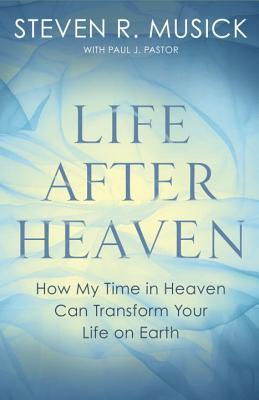
A deadly medical mistake sent a navy sailor to the presence of Jesus in heaven. He returned from his near-death experience with new eyes to see the kingdom of heaven in this life. Now he wants to help you experience heaven on earth today.
For years Steve Musick kept his amazing story to himself, afraid no one would believe or understand it. A major allergic reaction had stopped his heart, hurling him into a five-week coma and powerful experience of heaven. After returning to life, he couldn't forget the memory of that vibrant place--and, most of all, the loving words and touch of Jesus.
But that was only the beginning. An amazing series of miracles, dreams, and other supernatural events had been set in motion, showing Steve that heaven was close, even in this life. God was calling him to discover echoes of heaven in the here and now--echoes that can happen at any moment, to anyone--that bring overwhelming joy.
MY THOUGHTS:
I was drawn to this title when my dear Dad passed away earlier this year, and I couldn't help pondering a lot about what awaits our departed souls directly on the other side. I know there have been many books with theories written already, but some of them are just surmises like ours would be. That's most likely why books by people who claim to have had NDE's (near death experiences) intrigue us. I've seen them jokingly referred to as 'heavenly tourism' but for readers with open minds who are seeking the common threads, these books can offer a lot of hope and comfort.
Stephen Musick describes the sort of experience we all long to be true, in which he has a long, loving conversation with Jesus in an environment which would be enough to blow our physical senses, were we still in them. But this only takes up one chapter of the book. For the rest of it, he talks about the ripple effect this experience had on the rest of his life, and his day to day attitude.
He focuses on a simple, fragile phenomenon he calls 'bubbles of heaven.' It's when other-worldly or supernatural moments break briefly in to ours. For Musick, they're fleeting reminders of what his moment in heaven had been like, and his stated goal is to instruct readers so we can learn to recognise them in our lives too.
I really appreciate his emphasis on the simple nature of these, making them easy to dismiss as coincidence, good fortune, or whatever else our reason brushes them off with. We've been conditioned by our culture to believe that things worth our attention will probably be loud, obvious and hard to miss. To the contrary, they are often gentle enough to slip past us if we aren't aware. So the bulk of this book is probably about training our hearts to be aware.
All in all, it's a spirit lifting and encouraging read which came along at a time I appreciated it.
Thanks to Water Brook Press and Blogging for Books for giving me a copy through Net Galley.
Published on June 10, 2017 05:45
June 7, 2017
40 excellent reasons to write

Not long ago, I shared this blog post with six excellent reasons to read. Here's the other side of the coin, but this time, instead of less than ten, I felt challenged to come up with 40. I'd seen a few other bloggers sharing 40 reasons why they like to write, but accidentally lost them. I was scrolling down my Bloglovin' feed, then went off to try the challenge, but when I got back, they'd already slipped off the screen into that secret world where old, unsaved documents go. I hadn't expected the disappearance to be quite so quick. It's a shame I can't refer back to the original posts, but since I'd written my reasons, I thought I'd share them anyway.
Since I was brainstorming really fast, I just jotted these down as they came to me. There may be a bit of overlap between points, but hopefully you'll allow a few subtle differences. Also, I haven't arranged this into any sort of theme. Over the years I've written fiction, articles, essays, blog posts, reviews and lists. This isn't intended to elevate any form of writing over the others, but just celebrate writing in general.
The photos I've shared are just to remind myself that I've always been doing this. If I had 10 cents for every piece of paper I've covered front and back, I'd be a millionaire.
Here are my first ten.
1) Words are such beautiful raw materials, I like the challenge to play around and create something expressive and attractive.
2) Reading the writing of others has always been a source of fun and comfort to me, so I appreciate the chance to pass it on.
3) If a sudden thought comes, I prefer to nail it to paper rather than let it escape.
4) It's an enjoyable challenge to try to get people feeling empathy, and even love, for somebody they disapproved of to start with.
5) Being able to put words in other people's mouths is fun. There's an element of passing the buck, and claiming that they are the views of the character or person quoted, and not necessarily my own.
6) Verbal communication isn't my strength, so I prefer to express my ideas in a way I feel confident and can take my time. Writing seems to tick the boxes.
7) It's nice to leave a record of how I felt and processed things at a particular time, so I can return to it afterwards and see what I learned.
8) It adds to the permanent records of what life was like during a particular time period. I know that museums and historical societies are fascinated by old diaries for good reason.
9) It may help other people laugh and be happy.
10) It's my way of reaching out and being social. We can influence people from our own computers or lounge chairs, without the need to travel if we don't have the means.
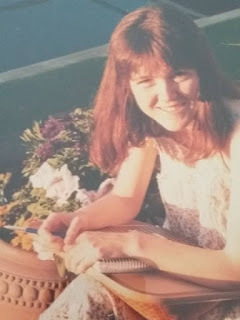
I was certain I could come up with another block of ten at least. The second lot flowed off the pen just as fast as the first. (That's me in my teens, writing in the diary I used to keep.)
11) The chance to offer my own perspective on issues I feel strongly about is too good to miss.
12) The chance to express the admiration and love I feel for other authors' characters is also too good to miss.
13) I love art, but since I'm no good with pencils, charcoal, brushes or clay, words are the only raw material I feel confident trying to use.
14) The editing, polishing and straightening side has its own appeal. It's good to be able to present something and say, 'I feel that's my best.'
15) It helps introduce me to other people from around the world who I wouldn't have discovered otherwise. I follow blogs from places as far away as New York and Ireland.
16) As corny as this may sound, it extends my friendship base to people in the fictional world too. When you spend a lot of time in the heads of made-up characters, it's natural to think of them as part of your own friendship base.
17) It gives me the chance to figure out what I really think, when I re-read what I've scribbled.
18) It gives me the chance to try to lift my own mood, if I'm feeling blue.
19) I enjoy opportunities to broaden my own vocabulary, and re-acquaint myself with words I've known but have slipped out of my mind. Consulting an online Thesaurus for alternative words is fun, especially when I see one and instantly decide, 'That's it!'
20) It allows me to try and be a comedian, in my own low-key way, when I feel like it.
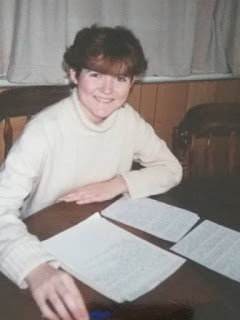
That was the halfway mark, and I was feeling more confident that I might be able to make it. (That's me in my early twenties, working on some essay. I don't remember what it was, but just that it was 'highly important'!)
21) It allows me to flex my generosity muscles when I get the chance to rave about other books and make recommendations.
22) It makes me feel I'm leaving a positive footprint.
23) It's my way of being a photographer with words instead of visual images, and taking snapshots of specific moments in time.
24) It's one of the best ways for introverts to communicate and feel we're part of things, since it's actually been scientifically proven that we're better with written words than vocal ones.
25) Because I've had so much practice over the years, it's too deeply ingrained to just drop.
26) Taking notes helps me form connections and make sense of the world. Lots of conclusions I've drawn come straight from my own writing.
27) It helps me look over what I've observed, and see connections I'd otherwise have missed.
28) It allows me to jump out of my own head and take a spell in someone else's for awhile.
29) It gives my imagination an anchor, instead of just letting ideas drift out like smoke rings in the ether.
30) It helps me hone in and notice minute, micro details I might have otherwise overlooked.
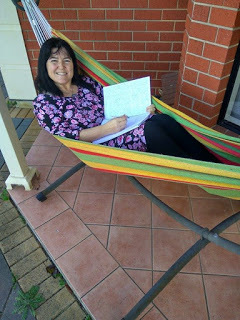
I was at the homeward stretch. I knew I could do it now. One more block. (That's me just recently, writing out on the hammock on a warm day.)
31) In social situations, I sometimes find it difficult to get a word in. Blogging and writing is an alternative.
32) I like the domino effect. One person's words has bearing on someone else, which effects someone else, and so on. Being a cog in a wheel, doing my bit, is a nice idea.
33) When you're on a low budget, it's basically the cheapest hobby.
34) Using words, like building blocks, to put somebody else in the picture, is a heady feeling.
35) Enabling others to take 5, put their feet up and read what you've written may be doing them a favour. Especially if they like what they find.
36) Debating club days at school are long behind me. It's fun to be able to follow a well-expressed argument thread and even add my two cents worth.
37) If I don't have pens and blank paper at hand to jot things down, I just feel jittery and stifled.
38) The deeper psychological and social aspects of sharing stories, either fictional or true, interests me.
39) If you're not always quick-witted, you can take time to be witty, and give the illusion that you're quick witted. A page of quick dialogue may give the impression it's off-the-cuff, while it's really taken several separate moments to put together.
40) It's possible, in my bad mood moments, to cheer myself up with something I've written in my good mood moments.
So do you enjoy writing too? Dare I challenge you to think of 40 reasons of your own? I found this well worth the surprisingly quick time it took, and may even print this off as a tangible reminder to myself of why I keep going.
Published on June 07, 2017 12:00
June 4, 2017
'When Changing Nothing Changes Everything' by Laurie Polich Short

Reframing your perspective can transform your life.
We often face circumstances that we cannot change—a job we are forced to keep, a relationship that did not work out, a decision we cannot take back. Life can overwhelm us, and we may not be able to see past the obstacles in our path.
Laurie Short offers a simple but revolutionary idea: change nothing that is around you yet still change everything about your life. With the help of four different lenses, Laurie shows how the way you see can have an impact on how you live. If you put on the right lenses, you can reframe whatever comes your way and embrace both the good and the bad, recognizing that every detail of your life is fully in God's sovereign hands. Your perspective has more power than you think to determine the course of your life.
MY THOUGHTS:
I love the implications of this title. Instead of changing our behaviour and circumstances with the advice of yet another self help book, we could simply try tweaking our attitudes and the way we view our lives. It may take a pivotal turn, but could be well worth it in the long run.
I like the author's friendly and warm approach, and the way she sprinkles each chapter with stories and examples. Laurie Polich Short has come up with four possible ways we can view our personal worlds, which she likens to telescopes or magnifying glasses. There's the Big Lens view, which helps us see the broader perspective; the Present View Lens, which alerts us to what we might be missing; the Rear View Lens, which gives us insight in retrospect; and finally the Higher View, which focuses on hidden things which God might want to show us. Although none of these actually change what's in front of us, they enable us to see expanded versions.
Although it's a cool concept, the lens analogy has the potential to get a bit confusing at times, simply because the lenses tend to contradict each other. With just one set of spiritual eyes, we're being told to simultaneously look forward, back and stay where we are. In each section, we've instructed to focus on either our past, present or future, and take the spotlight off each of the others. That sounds bewildering, but I guess it's up to each reader to figure out which 'lens' to employ for each new circumstance. It's got the potential to tie our brains in knots.
The stories were interesting, although I thought a few were stretched a bit far. She mentions how Ben Carson's mother's strict discipline helped give him the outlook to become a successful surgeon. Yes, that's all good. But then she goes on to mention another, more permissive mother whose son grew up to become Adolf Hitler. Whoa, with one simple paragraph, Short seemed to pin the blame for the way he turned out on his mother's shoulders. She probably didn't mean it to sound like such an indictment or broad generalisation, but I thought it was a fairly harsh call just the same.
On the whole, it's an easy read with some good material, but you might have to sift through to find what gels with you, and ignore the rest of it. Hey, maybe in that way, it may appeal to a wide audience.
Thanks to NetGalley and Inter Varsity Press for my review copy.
3 stars
Published on June 04, 2017 15:37
May 30, 2017
Famous Contented Prisoners
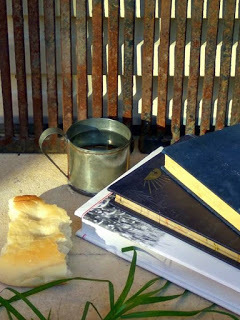
I made this list to go with my earlier one of grouchy tourists. The men on that list proved that having the range of the whole earth to roam doesn't necessarily make people happy. I intended this new one to prove the opposite, that being confined to a limited space doesn't necessarily quench a person's inner spirit. But I didn't expect my heart to be as touched as it turned out to be before I started.
Bricks and mortar may limit our physical presence, but not our souls, or our imaginations. In fact, these intangible parts of a person have been known to soar when confined within four walls. Usually I draw from works of fiction, which I expected to be the case here too. But when I brainstormed, the result surprised me. With the exception of a few down the bottom, this list is full of real, heroic folk from history, who not only bore their suffering with incredible courage, but left powerful written legacies for the rest of us, often produced from within the very walls that contained them. It took longer than several of my other lists to compile, but when I cast my eye down the names and think of the inspiration and impact these famous prisoners have made on me and many others, it's well worth it. Here they are.
I'll start off with a couple of biblical prisoners.
1) The Apostle Paul
Scholars say there's no doubt Paul was in prison when he composed his letter to the Philippians. It might have been the Roman imprisonment at the end of Acts, or even an earlier imprisonment at Caesarea. He was no stranger to custody, and this epistle has a sense of his impending death all through. That's why it's so powerful when Paul was able to write the words we love, 'I know what it is to be in need, and I know what it is to have plenty. I have learned the secret of being content in any and every situation, whether well fed or hungry, whether living in plenty or in want.' Since he made the statement, he's a good one to get the ball rolling.
2) Joseph
In the book of Genesis, this young hero was imprisoned in a dungeon for several years, for a crime he didn't commit. His employer's wife made a false accusation when he refused her advances. Joseph managed to make the best of an unfair situation. He became respected by the warden, who put him in charge of other prisoners. Joseph always tried to do whatever he could to help others, such as the baker and the cup bearer. He didn't use his time in prison sitting around and bemoaning his own fate.
Now I'll continue with other famous prisoners throughout history.
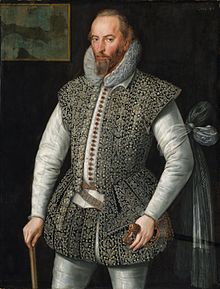 3) Sir Walter Raleigh
3) Sir Walter RaleighThis famous Elizabethan gentleman politician and spy was imprisoned in the Tower of London on a couple of separate occasions. The angry Queen Bess banished him there, when he secretly married one of her ladies in waiting without her permission. (Legend has it that she fancied him herself.) Years after obtaining his release from that one, he was thrown in again after being involved in a plot against King James 1. Imprisonment was just part of life's rich tapestry for the jaunty Sir Walter, who was often seen promenading along the balcony, as dapper as ever.
4) Mary, Queen of Scots
Incarceration was a fact of life for this young Scottish monarch. When she lost the throne of Scotland and fled to throw herself on the mercy of her English cousin, Elizabeth 1, she was imprisoned instead. Cautious Elizabeth perceived her as a threat. (Yeah, she threw Sir Walter Raleigh behind bars too. That would seem one of Elizabeth's favourite ways of dealing with people she didn't want to deal with.) They were nice, elaborate prisons, being castles and manor houses, and Mary managed to keep up with her reading and handiwork. But they were prisons nonetheless, and she was found guilty of plotting to assassinate Elizabeth. It must have been cooked up during her captivity. Mary was executed.
5) John Bunyan
 He lived during the English Civil War, and spent twelve years in jail for refusing to stop preaching. Bunyan was a non-conformist, and when the monarchy was restored, they tried to curtail the freedom of such people, but he wouldn't be stopped. So using his time well, he did a lot of writing, including work on 'The Pilgrim's Progress', his famous allegory about the Christian life.
He lived during the English Civil War, and spent twelve years in jail for refusing to stop preaching. Bunyan was a non-conformist, and when the monarchy was restored, they tried to curtail the freedom of such people, but he wouldn't be stopped. So using his time well, he did a lot of writing, including work on 'The Pilgrim's Progress', his famous allegory about the Christian life.6) Emily Dickinson
She was a nineteenth century American poet who chose to live as a recluse in her family home, always wearing white and never coming out. It was a personal decision by an intensely private person. Some regard her lifestyle as a self-imposed prison, yet the volume and quality of the work Emily produced seems to prove that it suited her.
Next I have some more modern, twentieth century prisoners, who have been among the most heroic of all. In fact 'contented' doesn't seem like quite the right description for them, considering the atrocities and cruelty they lived through. But at the risk of diminishing their valiant lives by my word choice, I really want them on this list, and trust they'd understand my intention to honour them.
 7) Viktor Frankl
7) Viktor FranklHe was an Austrian physician who discovered the key to survival when he was interred in a concentration camp. Those who managed to find meaning and purpose in even the harshest life were the same people most likely to remain alive the longest. Upon release, he wrote the first draft of his famous book, 'Man's Search for Meaning' in a matter of a week or two.

8) Corrie ten Boom
She was a Dutch watchmaker who helped many Jews escape the Nazi Holocaust. When Corrie and her family were found out, they were imprisoned. Her famous book 'The Hiding Place' deals with her prison experiences and the attitude of complete love and forgiveness which helped her to survive.
9) Anne Frank
 As a teenage girl, she lived hidden away with her family and some friends in a few secret rooms behind a bookcase in the building where her father worked. As Jews during the German population of Amsterdam, they were forced to conceal themselves. It was there, in the Secret Annexe, where Anne kept her famous diary. They were eventually discovered by the Gestapo and taken to concentration camps, where she died. The diary shows that Anne always retained her optimism and literary ambitions, which kept her spirits up during their enforced isolation. She was an amazing young heroine.
As a teenage girl, she lived hidden away with her family and some friends in a few secret rooms behind a bookcase in the building where her father worked. As Jews during the German population of Amsterdam, they were forced to conceal themselves. It was there, in the Secret Annexe, where Anne kept her famous diary. They were eventually discovered by the Gestapo and taken to concentration camps, where she died. The diary shows that Anne always retained her optimism and literary ambitions, which kept her spirits up during their enforced isolation. She was an amazing young heroine. 10) Nelson Mandela
This South African hero was imprisoned for 27 years because of his strong anti-Apartheid stance. His rise from being regarded as a dangerous menace and national threat to President makes his one of the most amazing lives of modern times. He didn't waste those years in prison, but studied by correspondence and kept abreast of the news. A worthy hero for all the people.

11) Peacock Blue (by Rosanne Hawke)
This is the first work of fiction I've referred to so far, but it's based on sad fact. It's set in Pakistan. Peacock Blue is the online name of Aster Suleiman, a teenage girl who made a mistake on a school exam that had her arrested on a charge of blasphemy. It's a powerful story, in which Aster is encouraged to cling to her love of the written word and write her own story.
Now, just to lighten this blog post a bit, I'll finish off with a few prisoners from popular fiction who may make us smile. And on the spur of the moment, I slipped in a close-to-home example at the very end.
12) Belle
The heroine of Beauty and the Beast willingly volunteers to be the angry beast's captive in her father's place. He'd had been locked up for daring to pick a rose from the garden. Belle resigns herself to a long, lonely existence in the gloomy castle, but her sacrificial gesture leads to more happiness than she ever anticipated, since she finds true love.
 13) Sirius Black
13) Sirius BlackThe poor dude. Not only was he wrongfully imprisoned in Azkaban for years, but the fake story of how he betrayed Lily and James Potter was circulating all that time. When he bravely manages to escape, he finds he's regarded as the scourge of the wizarding world. He has to convince Harry Potter that rather than being a desperate criminal, he's always been his loving god-father.
14) James Mortmain
 The frustrated father of 'I Capture the Castle' has kept his family in abject poverty, nursing his writer's block for several years. So two of his children, Cassandra and Thomas, take matters in their own hands with a sneaky plan to lock him up in one of the towers. They feed him delicious meals, but decide he must show them at least 50 decent pages before they let him out. And although he blustered a lot, their plan sort of worked. You have to read it to find out how.
The frustrated father of 'I Capture the Castle' has kept his family in abject poverty, nursing his writer's block for several years. So two of his children, Cassandra and Thomas, take matters in their own hands with a sneaky plan to lock him up in one of the towers. They feed him delicious meals, but decide he must show them at least 50 decent pages before they let him out. And although he blustered a lot, their plan sort of worked. You have to read it to find out how. 15) Porridge
Does anyone else remember the old TV sitcom about a group of jailbirds, starring Ronnie Barker and Richard Beckinsale? I used to watch it when I was little, and looked forward to the entertainment. They really put a comical slant on being in prison, and I wouldn't mind watching the episodes over again.
16) My Quenarden Trilogy
 Several years ago, I even had a go at writing a fantasy adventure series of my own, and I utilised the prison cell. The evil tyrant of the land had a range of dungeons in his filthy, hollowed-out mountain, where captives were kept. And his lackeys, who he allowed himself to call co-rulers of the land, kept a few of my lovely heroines imprisoned in their castle, for reasons that make perfect sense if you read the books.
Several years ago, I even had a go at writing a fantasy adventure series of my own, and I utilised the prison cell. The evil tyrant of the land had a range of dungeons in his filthy, hollowed-out mountain, where captives were kept. And his lackeys, who he allowed himself to call co-rulers of the land, kept a few of my lovely heroines imprisoned in their castle, for reasons that make perfect sense if you read the books.So there we have them. Normally I'd say, 'Go and read the novels they're in,' but for most of the people on this list, I'll say instead, 'Go and read what they wrote.' Did you have a similar reaction of awe to mine? Or can you think of any other noteworthy or inspiring prisoners, or even funny ones?
Published on May 30, 2017 12:00
May 28, 2017
'Serpent's Delight' by Ruth Park
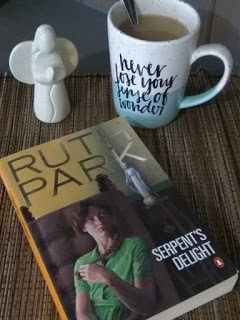
When Geraldine, youngest of the good-looking Pond sisters, announces that she has had a vision of the Blessed Virgin, her family is shot from its mundane middle-class existence into the glare of publicity. The once peaceful, closely knit family is suddenly full of mistrust and tensions.
Serpent's Delight, a story of five women, each determined to get her own way, is a tender and perceptive study that highlights the irony of the human condition.
MY THOUGHTS:
This is an intriguing Aussie story which makes us wonder if we'll ever fathom what really happened. The Pond family are respectable, middle-class Catholics in Sydney. Then one day, Geraldine, the youngest daughter, claims to have had encounters with the Virgin Mary in the corner of their loungeroom.
Simple-hearted, faithful Ma is willing to believe that her teenager is a saint, but then repercussions from the news spread out to affect all the other members of the family. There's Carrie, the business women; Ivy, the nun; Elva, the exhausted mother of a huge brood; and all their children. And poor cheery, content Pa has his world turn crazy.
I love how Ruth Park gets into the heads of each family member with great depth and understanding, right down to the oldest, youngest and in-laws. She must have been a compassionate person herself, because I get the impression that she's fond of every single character, including those presented as less savoury. You can't help finishing with the sense that if all these quirky characters have their inner beauty, then so do the people we encounter during our day to day lives.
Alternating point of view is perfect for a book like this. The only person whose head we don't get to visit is Geraldine's, which is ironic since she's the crux of the story. Ironic but appropriate, because if we did know what she's thinking, we might be able to fathom the mystery of what really happened. Did she really see the Virgin Mary or didn't she? Geraldine certainly has the mystique of a closed book.
Ruth Park is like an alchemist who brings beauty out of the old, frayed and familiar. Her novels remind me of reading poetry. For example, one scene takes place on a rocky ledge over the Sydney Harbour. How's this for a line? 'That mighty cliff, the rampart of a continent, shook with a steady beat as the breakers crashed upon it. It was like lying upon the breast of a planet and hearing its heart.' That's from the point of view of Carrie's daughter Ann, one of my favourite characters. There are many similar instances when I just wanted to pause and drink in the word pictures.
A number of interesting questions are raised beyond theological ones. Should people be free to choose a life they think is a personal fit, rather than letting some self-imposed authority figure force them to do what they think will be best? Does the herd mentality turn harmless individuals into an unreasonable mob?
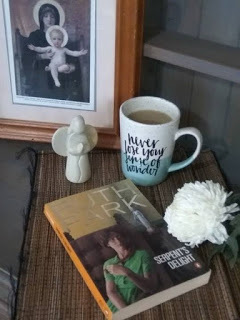
Although I really wanted to find out what would happen, some of the quotes gave me pause for thought as well as the descriptions.
Father Wheelwright (a young priest): You seem so shut in, Miss Pond. It isn't healthy for a young woman to be like that.
Geraldine: You don't make allowances for character, Father.
Cliff (Carrie's estranged husband): People aren't half as shocked at the four-letter words as they are at the three-letter words. Sin and God for instance. If you mention them in an ordinary conversation, people turn away uneasily as if you've said something obscene.
(Wow, he said that in the early twentieth century. Some things never change.)
My favourite a-ha moment was sandwiched in a conversation between the two eldest sisters, Carrie and Ivy.
Carrie: Are you happy, Ivy?
Ivy: No, but I'm content. And how about you?
They go on to probe into the difference between seeking either one or the other. One is attainable, and even imparts serenity, while the other is an exhausting treadmill that leads nowhere. The intriguing Ivy had the common sense to realise this difference from a young age. I regarded her as one of the most fascinating characters all the way through. Although that comment could easily be glossed over, it came at a moment when I thought it was her secret.
Overall, my biggest problem was that some of the more minor characters were so great, I'd love to know what became of them. I guess that's a five star problem for any book to have. And does the story come to a conclusion? Do we find out what really happened in the Ponds' loungeroom? Whoa, yeah! I'm sure it'll shock different readers in different ways, depending on our own characters.
5 stars
Published on May 28, 2017 12:00
The Vince Review
Author, blogger, reader, reviewer, mother of three. All this goes under the mantle of 'stay at home mum'. I also love walking and cooking when the mood strikes me. Getting stuck into a good book has a
Author, blogger, reader, reviewer, mother of three. All this goes under the mantle of 'stay at home mum'. I also love walking and cooking when the mood strikes me. Getting stuck into a good book has always been one of the best things ever.
I invite you to treat this blog like a book-finder. People often ask the question, "What should I read next?" I've done it myself. I try to read widely, so hopefully you will find something that will strike a chord with you. The impressions that good books make deserve to be shared.
I read contemporary, historical and fantasy genres. You'll find plenty of Christian books, but also some good ones from the wider market. I also read a bit of non-fiction to fill that gap between fiction, when I don't want to get straight on with a new story as the characters of the last are still playing so vividly in my head. ...more
I invite you to treat this blog like a book-finder. People often ask the question, "What should I read next?" I've done it myself. I try to read widely, so hopefully you will find something that will strike a chord with you. The impressions that good books make deserve to be shared.
I read contemporary, historical and fantasy genres. You'll find plenty of Christian books, but also some good ones from the wider market. I also read a bit of non-fiction to fill that gap between fiction, when I don't want to get straight on with a new story as the characters of the last are still playing so vividly in my head. ...more
- Paula Vince's profile
- 108 followers



